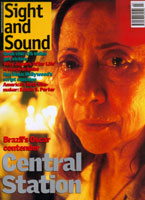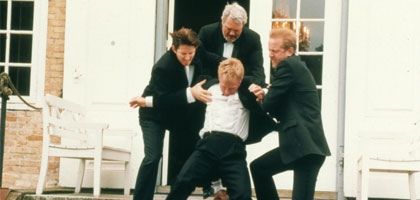
Festen
Denmark 1998

Reviewed by Peter Matthews
Synopsis
Our synopses give away the plot in full, including surprise twists.
Denmark, the present. To celebrate his sixtieth birthday, wealthy patriarch Helge Klingenfeldt and his wife Elsa throw a large party at the family hotel. Eldest son Christian, a successful Parisian restaurateur, and daughter Helene, an anthropologist, arrive. So does the uninvited younger son Michael - in disgrace for not attending the funeral of his sister Linda a few months before - with his wife Mette and their three children. Chambermaids Pia and Michelle try unsuccessfully to resume their respective love affairs with Christian and Michael.
Quartered in Linda's old bedroom, Helene finds an apparent suicide note which she conceals without reading. At the banquet, Christian announces to the assembled company that he and Linda were sexually abused as children by Helge. When no one believes him, Christian retreats to the kitchen where his boyhood friend Kim (now the hotel's chef) encourages him to stand his ground.
Kim, Pia and Michelle steal the guests' car keys so that all will be forced to stay. Helene's black lover Gbatokai arrives, much to the racist Michael's displeasure. Dinner proceeds, and Christian's next speech charges Helge with Linda's murder. Elsa begs Christian to apologise. Instead he tells the guests his mother once witnessed an episode of child abuse and did nothing about it. Eventually, Helene reads Linda's suicide note: she killed herself because she was still traumatised by her father's abuse. Michael kicks and beats his father, then reconciles with his elder brother. Christian invites Pia to come and live with him in Paris. At breakfast the next morning, the vanquished Helge tells his three children he still loves them. Michael orders him from the house.
Review
Suspicion is already stirring that the so-called vow of chastity taken by members of the Dogma 95 group, if not an outright scam, is at least intended with a pinch of irony. To clarify for those who have not yet plugged into the hype, a few years back Lars von Trier and some other Danish directors drew up a manifesto where they protested the decadent illusionism of contemporary cinema. Like so many fiery Martin Luthers seeking to restore the true faith, the Dogma directors swore to reclaim reality by a wholesale purge of their aesthetic means. Such indulgences as artificial lighting, optical effects and post-recorded sound were strictly outlawed. Location shooting was made compulsory, while the camera itself must be religiously handheld.
Since no one has ever accused the slippery and sophisticated von Trier of ingenuousness, it's an open question whether he and his Dogma cohorts are entirely straight-faced in proposing these fundamentalist theses or whether they remain merry postmodern pranksters, committed to nothing but paradox, devious game-playing and generally having us on. The first of Dogma's scorched-earth productions, Thomas Vinterberg's Festen, isn't exactly calculated to settle the controversy. Indeed, the more one thinks about this remarkable movie, the stranger it becomes.
From neo-realism to cinéma vérité, film history has reliably proved authenticity is a chimerical goal. Sooner or later, the impression of raw immediacy congeals and stands exposed as a style like any other. Initially, and for a long stretch, Festen seems to confirm one's scepticism. Vinterberg sticks it to the steadicam generation with a jumble of impeccably ugly shots, ranging from the bleached-out and watery to the muddily indecipherable (it doesn't help that it has been transferred from video). The vow of chastity omits to cite editing among its sundry taboos, but he further frays the audience's nerves by incessant, discombobulating shock cuts.
However, it's absurdly evident that, far from stripping away the spurious layers of art, the miasmic cinematography and meat-cleaver continuity comprise nearly the most outré style imaginable. This would appear to make rather a hash of the manifesto's stern caveats against auteurism (none of the Dogma directors receives official screen credit) - especially as Vinterberg comes incestuously close to plying the same faux-naïf techniques originated by von Trier for The Kingdom television series and Breaking the Waves.
If a transparency of means is the true object of Festen, then it bombs out miserably. Peering as one must through a perpetual celluloid haze and juggled about by the off-kilter, fun-house framing, one is made highly conscious of the thick material contrivance of the image. Yet what's perhaps most fascinating about the movie is the way it seems to incorporate a sense of its own inevitable failure.
The story tells of the disgorging of a childhood trauma to the eventual rout of a stately upper-class birthday bash, and this conception allows scenes of unflappable public propriety to alternate satirically with sordid family squabbles behind closed doors. More than a few of the screaming and punching matches the siblings engage in feel a little trumped-up. And you can't quite bury your misgiving that half the commotion is dictated by the need to justify the camerawork, instead of the other way round. But Festen means to keep the viewer wavering precisely between belief and incredulity - sometimes stitched into the reality-effect, sometimes holding it at a long tether.
What with the house-party setting, the frisky chambermaids purloining the guests' car keys and the plucky hero Christian, repeatedly ejected from polite society but ever bouncing back to deliver another blistering speech, the action frequently resembles a surreal farce of the order of Buñuel's The Exterminating Angel (1962) and The Discreet Charm of the Bourgeoisie (1972), where the party goers were similarly grounded. Yet the formal symmetries of the plot appear so at odds with Dogma's ditch-water house style you wonder whether that isn't the whole cynical point: to show that the style can be slapped on and peeled off as effortlessly as a decal.
In a more crucial sense, however, Festen eminently succeeds. There can't be much doubt that the stripped-down home-movie aesthetic forces the actors to dig into themselves. Their contingent flickers of hesitancy and uncertainty serve very well to simulate the mask of bourgeois complacency crumbling under the pressure of truth. At such moments, Festen transcends its own faddish affectations and becomes triumphantly the near-documentary it purports to be.
Credits
- Producer
- Brigitte Hald
- Screenplay
- Thomas Vinterberg
- Mogens Rukov
- From an idea by
- Thomas Vinterberg
- Director of Photography
- Anthony Dod Mantle
- Editor
- Valdís Óskarsdóttir
- Piano/Original Score
- Lars Bo Jensen
- ©Nimbus Film ApS
- Production Companies
- Nimbus Film presents a Nimbus Film production in collaboration with DR TV
- With support from Nordisk Film & TV-Fond
- Line Producer
- Morten Kaufmann
- Production
- Signe Jensen
- Torben Stig Nielsen
- Karina Strand
- Camilla Thomsen
- David Østerbøg
- Mie Andreasen
- Assistant Director
- Eigil Jakobsen
- Casting
- Rie Hedegaard
- Panorama:
- Lene Seested
- 2nd Camera
- Peter Hjorth
- Soundtrack
- "I skovens dybe stille ro" by Fritz Andersen; "Jeg har set en rigtig negermand" by Niels C. Andersen; "Dacapo"; "Wedding Waltz" by Niels Wilhelm Gade
- Sound Supervisor
- Morten Holm
- Location Synchronisation
- Thomas Caspersen
- Jan Gundtofte-Bruun
- Fights & Stunts
- Thomas Bo Larsen
- Cast
- Ulrich Thomsen
- Christian Klingenfeldt
- Henning Moritzen
- Helge Klingenfeldt
- Thomas Bo Larsen
- MichaelKlingenfeldt
- Paprika Steen
- Helene Klingenfeldt
- Birthe Neumann
- Elsa Klingenfeldt
- Trine Dyrholm
- Pia
Helle Dolleris- Mette
- Therese Glahn
- Michelle
- Klaus Bondam
- master of ceremonies
- Bjarne Henriksen
- Kim, chef
- Gbatokai Dakinah
- Gbatokai
- Lasse Lunderskov
- uncle
- Lars Brygmann
- receptionist
- Lene Laub Oksen
- sister
- Linda Laursen
- Birthe
- John Boas
- granddad
- Erna Boas
- grandma
- Bent Henningsen
- Poul Kajbæk
- Vibeke Dalset
- Janne Thomsen
- Anette Jakobsen
- Poul Petersen
- Gulli Sejrsen
- Vibeke Kaiser
- John Johnsen
- Dan Eilertsen
- Søren Søgreni
- Annette Jakobsen
- Kate Goldschmidt
- Jens Nørring
- Bent Kaiser
- Maria Myrgård
- Peter Krag
- Stig Poul Hansen
- guests/waiters
- Kaj Rasmussen
- Robert Strandgård
- Gry Worre Hallberg
- René
- in the kitchen
- Christine Louise Jørgensen
- Dorte Olofsen
- Kasper Olofsen
- Emilian Sejersen
- Susanne Funck
- Rosmarie Jørgensen
- Lasse Jacobsen
- Sigrid Aalbæk
- Mikkel Jacobsen
- children
- [uncredited]
- Thomas Vinterberg
- taxi driver
- Certificate
- 15
- Distributor
- Blue Light
- 9,507 feet
- 105 minutes 38 seconds
- Dolby
- In Colour
- Subtitles
